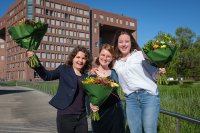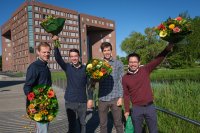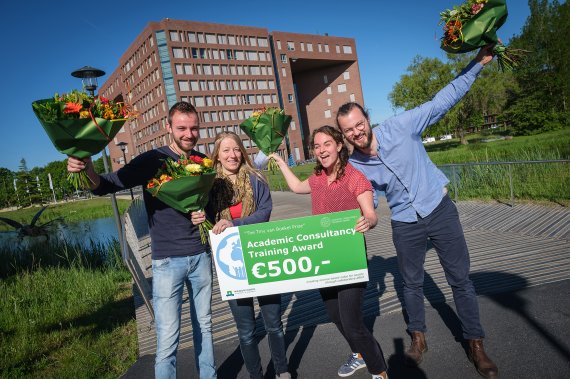At the beginning of this academic year, a team of six Master’s students came together to find an answer to the question, ‘Is it possible to run an agroforesty farm in a water catchment area in a way that is cost-effective for the farmer without threatening the quality or quantity of the water?’
The students worked on answering this question fulltime for two months. They did so well that on Monday 13 May they received the very first ACT award worth 500 euros. After the prizegiving, Resource talked to four of the six team members: Femke Tober, Isabella Selin Norén (both Plant Sciences), Jits Riepma (Biosystems Engineering) and Jasper Roebroek (Earth and Environment). Evita Laheij (Organic Agriculture) and Daan van Keulen (Hydrology) were on the team too, but could not attend the prizegiving.
What was the most challenging thing about your ACT project?Tober: ‘A question like this involves several different parties and they all have different interests. The client, the Dutch Agroforestry Foundation (Agrobosbouw), represents the farmers’ side of things, and wants to know how to maximize profits. And on the other side, you have water suppliers, who want sufficient clean drinking water at no extra cost.’
How did you solve that?Riepma: ‘We came up with two scenarios in order to do justice to both sides. It went very smoothly, actually. Because we are a multidisciplinary team, everyone wanted to put forward their own perspective. One scenario would focus more on the farmers’ side, and the other more on the water extraction side. Both systems are cost-effective and practically feasible for the farmer, without endangering the quality or quantity of water. So now, Agrobosbouw and the water company can decide for themselves what they do with our recommendations in the end.’
What was your experience of ACT?Riepma: ‘You are put in a group with five other students who you don’t know yet. You get presented with a single problem, which you have got to solve together. ACT brings group work to a whole new level.’ Selin Norén: ‘To answer our question we needed knowledge about agriculture, water and plants. Those were precisely the disciplines we had as a team, so we complemented each other.’ Tober: ‘Because each person on the team takes a different view of the assignment, you learn to look beyond your own discipline. That puts everything you know in a broader perspective.’ Roebroek: ‘Another good thing about ACT is that you are working for a real client on a real question. We went to the water catchment area to see what it looks like and to talk to stakeholders. That also makes the assignment more real.’
As a team we had precisely the right disciplines, so we complemented each other
What are you going to do with the prize money?Tober: ‘I was labelled the alcoholic because I kept suggesting we all go for a beer together. In the end we didn’t do that very often at all, so with the prize money we are going out for dinner and a few beers at Kruimig.’
WHAT IS ACT?
Why study hypothetical issues if you can solve real-life problems? That is the idea behind Academic Consultancy Training (ACT). Clients put a problem to a group of students from a range of Master’s programmes, who work towards a shared recommendation from their different disciplines. This enables students to get to know the field, and to try their hand at project work and multidisciplinary teamwork. And the clients get advice from academic consultants for next to nothing.
RUNNERS-UP

Healthier rehabilitation
How do you make a healthy diet and physical exercise integral to what a rehabilitation centre offers? Johanna Steketee, Nienke Lindt, Claudia Laarman, Yvonne Buunk, Jacco Ditewig and Lieke van Disseldorp developed a strategy which focussed on better communication and adjusting the physical environment at the healthcare centre. This team narrowly missed winning ACT Award but were among the top three. The jury said the students successfully combined health, communication and education.

Solar forests in the Netherlands?
Transparent solar panels at heights of four to six metres with crops growing in between them: that is a solar forest. The ACT team made up of Roel Dohmen, Corine de Winter, Tijmen Vries, Diego Nunez, Riccardo Missale and Neeltje van Dooren studied the potential for solar forests in the Netherlands. The students made 3D models and looked at the impact of the light that gets through on the crops. The outcome: solar forests can be profitable but experiments are needed to test the findings. This won them a place in the top three of the ACT Awards

 Jits Riepma, Isabella Selin Norén, Femke Tober and Jasper Roebroek (from left to right) won the first ACT Award with their team. Photo Guy Ackermans
Jits Riepma, Isabella Selin Norén, Femke Tober and Jasper Roebroek (from left to right) won the first ACT Award with their team. Photo Guy Ackermans